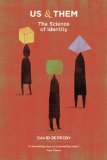Summary | Excerpt | Reviews | Beyond the Book | Readalikes | Genres & Themes | Author Bio

Critics' Opinion:
Readers' Opinion:
First Published:
Oct 2005, 384 pages
Paperback:
Oct 2008, 396 pages
 Book Reviewed by:
Book Reviewed by:
BookBrowse Review Team
Buy This Book
These nonliteral ways of saying "we" aren't logical, but
obviously they aren't meaningless. People understand them, and
distinguish them from nonsense. That means people use some set of rules
to decide that a sentence like "We Americans fought a war with
Spain" is comprehensible, while "We left-handed folk are a
generous people" is twaddle. These aren't the rules of science, but
so what? They do different work for the mind and heart.
Language, though, has its own rules, which don't respect this distinction. Grammar doesn't reveal when we're speaking logically and when
we're speaking - often with the same words - in the special code of
human kinds. So we're inclined to think the same word means the same
thing all the time. That hunch is wrong. The way it's wrong reminds me
of the story of an awkward lunch in 1944 where the British prime
minister, Winston Churchill, met Mr. Berlin.
Isaiah Berlin, the philosopher and historian, had been serving as a
diplomat in New York and Washington. Churchill had been impressed with
his work. He asked: "Berlin, what do you think is your most
important piece you've done for us lately?"
A little hesitantly, his guest replied: "'White
Christmas.'" He was the wrong Mr. Berlin - Irving, the songwriter,
not Isaiah, the polymath. In that instance, one word - Berlin -
certainly did not mean one thing. Human-kind words often exhibit this
variability. Just as a screwdriver in the toolbox is different from the
screwdriver you order from a bartender, so "we" in a sentence
like "We Americans beat Spain in a war" is different from the
"we" in "We Americans number about 290 million."
One of those two meanings - we the citizens of the United States, as
defined by law, who are alive today - fits into the framework of
science. It describes physical objects that can be measured. The other
idea - we Americans, including people who no longer exist because they
died a century ago; we Americans, including people who did not
experience the war - comes out of different rules for defining we.
If human kinds have their own rules, separate from those of logic or
human institutions, and if those rules operate outside of our awareness,
then the scientific study of human-kind beliefs will have some weird
implications. For one thing, trivial, meaningless, ephemeral human kinds
- if they meet the requirements of the hidden rules - could make and
unmake people's lives with the same force as the human kinds we respect,
like religions, nations, and ethnicities.
It's a strange idea. Could human kinds like "Star Trek fan"
and "Porsche owner" ever weigh as heavy in a human heart as a
religious tradition, with all its culture and moral seriousness? If that
were so, then history would afford examples of oddball academic ideas
that turned into the basis for mass murder; it would include instances
of people changing their lives, even killing and dying, for sports teams
or handkerchiefs.
Most peculiar. Yet this has happened throughout history. That too is
part of the evidence that human kinds have a separate realm in the mind.
In the nineteenth century, linguists and anthropologists took a
Sanskrit word for noble and turned it into a term to describe a family
of ancient languages. So the human kind called "Aryans" was
born. Languages were all it referred to, wrote the German scholar Max
Müller: "I have declared again and again that if I say Aryas, I
mean neither blood nor bones, nor hair, nor skull." Nonetheless, as
Müller's protest shows, this academic term quickly took on tribal
trappings. A few decades later, reinforced by other newly created human
kinds, like National Socialist and "expert" on Jewish matters
-
assigned by law to every government office under Hitler - Aryan was a
life-and-death human kind. Nowadays, in the form of gangs like the Aryan
Brotherhood in American prisons, it continues to be a category that gets
people killed.
Copyright © 2005 by David Berreby. No part of this book maybe reproduced without written permission from the publisher.





The Flower Sisters
by Michelle Collins Anderson
From the new Fannie Flagg of the Ozarks, a richly-woven story of family, forgiveness, and reinvention.

The House on Biscayne Bay
by Chanel Cleeton
As death stalks a gothic mansion in Miami, the lives of two women intertwine as the past and present collide.

The Funeral Cryer by Wenyan Lu
Debut novelist Wenyan Lu brings us this witty yet profound story about one woman's midlife reawakening in contemporary rural China.
Your guide toexceptional books
BookBrowse seeks out and recommends the best in contemporary fiction and nonfiction—books that not only engage and entertain but also deepen our understanding of ourselves and the world around us.